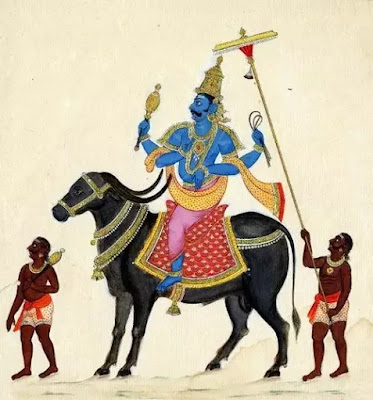Reading Notes: PDE Mahabharata, Part C
Taken from The Mahabharata, A Summary by John Mandeville Macfie.
42. Krishna's Visit
A very interesting difference in attitudes from the Ramayana. In the Ramayana, Sita unquestioningly and loyally follows Rama, without a single complaint. Draupadi, on the other hand, is so moved with anger that she even questions the gods. Surprisingly, Bhima takes Draupadi's side, for Yudhishthira to take action and take back his kingdom, but Yudhishthira, as Rama did, is more prudent toward the keeping of his word than his position.
The Mahabharata seems more...human than the Ramayana. I mean, yes, I get that Rama was the incarnation of Vishnu, so he's the "most righteous and upright, etc." but I feel as if the things he did/put up with were pretty unreasonable as a man. And the way he responded to them made him seem completely inhuman, which gives the reader nothing to connect to. In the Mahabharata, however, the reader can empathize with Draupadi, and have probably gone through a similar questioning of faith, the "God, why?!" phase.
50. Riddles at the Lake
Okay, so because they were being absolutely stupid, they drank of this water after hearing a voice that told them not to drink of the water. Unfortunately, Yudhishthira was there to save the day, making their deaths...not that impactful. It's like if in Avengers: Endgame everything Thanos did was magically undone with another snap of someone's fingers, or there was some deus ex machina that suddenly appeared and did so. In this case, Yudhishthira's character was developed in such a way that it is reasonable that he would be "wiser" than his brothers (wiser, as in, has common sense).
Also, why do gods just hang out in random locations? Was Dharma/Yama just chilling there waiting for someone to drink of the water?
42. Krishna's Visit
A very interesting difference in attitudes from the Ramayana. In the Ramayana, Sita unquestioningly and loyally follows Rama, without a single complaint. Draupadi, on the other hand, is so moved with anger that she even questions the gods. Surprisingly, Bhima takes Draupadi's side, for Yudhishthira to take action and take back his kingdom, but Yudhishthira, as Rama did, is more prudent toward the keeping of his word than his position.
The Mahabharata seems more...human than the Ramayana. I mean, yes, I get that Rama was the incarnation of Vishnu, so he's the "most righteous and upright, etc." but I feel as if the things he did/put up with were pretty unreasonable as a man. And the way he responded to them made him seem completely inhuman, which gives the reader nothing to connect to. In the Mahabharata, however, the reader can empathize with Draupadi, and have probably gone through a similar questioning of faith, the "God, why?!" phase.
50. Riddles at the Lake
Okay, so because they were being absolutely stupid, they drank of this water after hearing a voice that told them not to drink of the water. Unfortunately, Yudhishthira was there to save the day, making their deaths...not that impactful. It's like if in Avengers: Endgame everything Thanos did was magically undone with another snap of someone's fingers, or there was some deus ex machina that suddenly appeared and did so. In this case, Yudhishthira's character was developed in such a way that it is reasonable that he would be "wiser" than his brothers (wiser, as in, has common sense).
Also, why do gods just hang out in random locations? Was Dharma/Yama just chilling there waiting for someone to drink of the water?
(Yama, god of death, from Ancient History Encyclopedia)



Comments
Post a Comment